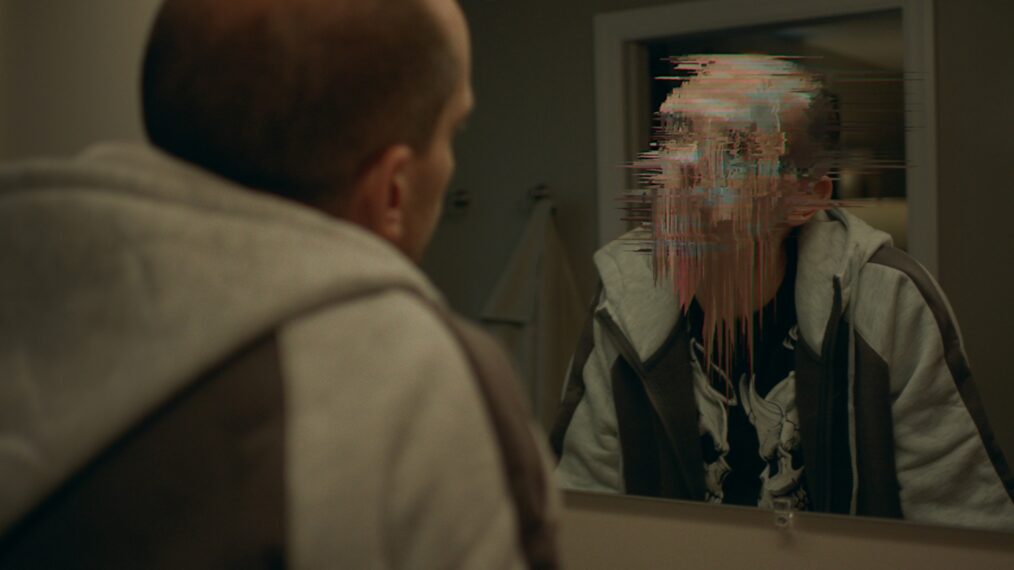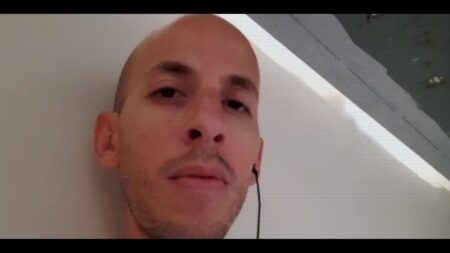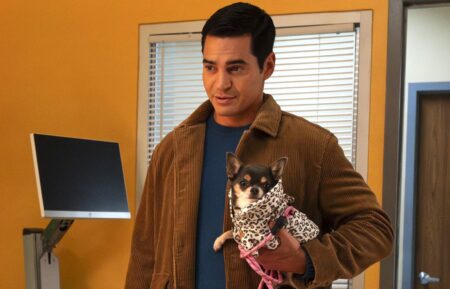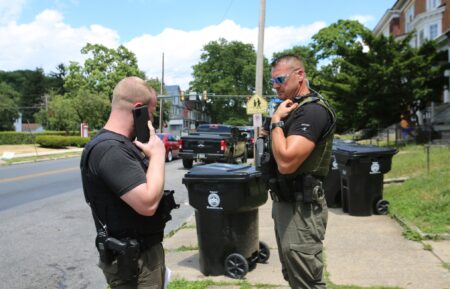‘CTRL+ALT+DESIRE’: Most Chilling Moments in Paramount+’s New True-Crime Docuseries

Digital obsession turned deadly in real life for the family of Grant Amato, who was accused and ultimately convicted of murdering his family. And Paramount+’s chilling new docuseries CTRL+ALT+DESIRE offers unprecedented accounts from the man at the center of the macabre murders himself.
The three-part series features first-person testimonials from Amato, who doggedly maintains his innocence at the start of the footage, during which he’s being tried for the murders of his father, mother, and brother in January 2019. The evidence against him, however, is extremely incriminating, and the documentarian, even given access to Amato for four years, presents an unflinching view of Amato’s many ills.
There are a ton of shudder-inducing moments to be found in CTRL+ALT+DESIRE from start to finish, and these are just some of the ones that got under our skin.
His obsession reached a fever pitch right away.
Grant Amato’s life as a young adult started out promising enough. In the docuseries, his close-knit relationship with his elder brother Cody is explored in depth, and we learn that the two went to high school and then college together to study nursing. While Cody successfully completed a nurse anesthetist specialty program, Grant dropped out of the same and got a job as a hospital nurse. The two lived at home with their dad Chad and mother Margaret — according to him, this was the wish of their folks and each other — and things were going well enough for everyone until Grant got fired for stealing and unlawfully prescribing sedatives to patients he wanted to calm down.
He was immediately fired and, without work, quickly became addicted to online gaming and pornography. Though criminal charges against him were dropped, depression over his career failures took over, and he soon spent all of his time online in his room. It didn’t take long for his internet presence to become a full-blown addiction — particularly when it came to his favorite cam girl.
He was truly convinced they were in a relationship.
Grant Amato soon became enamored with a woman from Bulgaria named “Silviye,” who charged him hundreds and thousands of dollars to interact online through her cam feed. In the docuseries, he describes their relationship as one of true substance, claiming she would only drop her act and reveal her real self to him.
“My relationship with Silviye was like a buoy in the ocean,” he says in an unsettling bit of possibly contraband phone confessional. “I was not successful at the time. I had lost a lot of traction with my family, my career goals, my life path. She didn’t know all the negatives that were going on in my life, so I could just get lost in that relationship.”
The trouble was, he felt compelled to pretend to be wealthy enough to shower her with tokens (worth money), to the point that he racked up more than $200,000 in debt using stolen credit cards from his family. In the docuseries, however, he maintains their relationship was never about the money but a real-deal, human-level connection.
His parents still gave him another chance, but it backfired.
Despite putting his parents and brother several hundred thousands of dollars in the hole, they still chose to support him upon finding out about his expensive and disturbing digital habits. They even forked over several thousand dollars to put him into a rehabilitation facility for pornography addiction and accepted him back into their home when his treatment was complete.
Their reunion with him was, however, conditional. His guns were removed from the house, he had to get employment, and, obviously, he had to stop foisting buckets of cash at women on the internet. However, Grant Amato’s mother took pity on his obsession with Silviye and allowed him to use her phone to contact her. Once his father found out, though, Grant was immediately exiled from the house. Soon after, the same house he was kicked out of became the scene of a grisly triple homicide: His mother, father, and brother were all murdered in their home, with execution-style bullet wounds to their heads, and the scene was staged to look like a murder-suicide by his brother Cody.
His one remaining brother figured it out within minutes.
After Grant Amato was found and arrested, he was visited at the precinct by his older brother Jason Amato, who no longer lived with their parents, and, after a very warm embrace, he asked him right away whether Grant was responsible for these deaths. Jason was unconvinced by Grant’s narrative, though, insisting that his story simply didn’t add up. He ultimately testified for the prosecution at his trial. Grant’s reaction to Jason saying on the stand that he loved him was ice cold with its lack of feeling. Meanwhile, Jason’s reaction to the jury’s reading of a guilty verdict was nothing short of heartbreaking… particularly when compared to Grant’s own stoicism upon receiving a life sentence without the possibility of parole.
Grant seemed chuffed to become internet famous.
Considering where this entire story began, Grant’s reaction to finding out he’s become a fixture of internet true-crime sleuths seems downright diabolical. When told he is “popular” by the filmmaker, Colin Archdeacon, he giggles and says, “Yep that’s me!”
In voiceover, Grant Amato then says, “A couple of people told me that their girl saw me on TV and that I’m famous. I’ve had hundreds and hundreds of women who have reached out to me. … But when they do start to talk to me, and I’m not this psychopath serial killer that they’ve seen a lot of documentaries on, they kind of leave me in the past and that kinda hurts me a little bit. Especially in this world of prison where you’re extremely deprived of everything beautiful. But in the same breath, I’ve had one person in prison, one singular person who has truly reignited my heart, gave me hope, made me see that my life isn’t over.”
He had another relationship that’s very uncomfortable to watch.
In a carousel of prison footage, Grant is shown leaving messages for this mystery person, his “precious little kitty” who he’ll “love 5ever.” This person, it turns out, is called “Mary” and only appears as a shadowy figure with a distorted voice who claims to have met Grant through their true-crime obsession.
Mary reveals that Grant fell in love with them due to their online persona. Considering the onslaught of emails and gushy phone messages he was captured sending Mary — and the dual tattoos he got on his wrists as tribute pieces — his obsession with Mary matched that of Silviye, minus all the money.
He may or may not have fabricated a letter from Silviye.
After his imprisonment, Grant claims in the docuseries, he received a letter of apology from Silviye, which read, “My light, I have never forgotten you, and I do not have any excuse for the separation that has existed since the circumstances of your life became what they are. You are still the only man to treat me the way you did. You made me feel like a little girl again. You will always be my light and my superhero.” His claim that the letter is entirely real is… unconvincing, to say the least — at least, until we find out that she did once send him a copy of her bloodwork for evaluation???
He finally confessed to everything.
After losing his appeal outright, Grant Amato decides to finally lay his cards on the table to filmmaker Colin Archdeacon after four years of bold-faced lies.
“I always appreciate your assistance and the professionalism and respect and everything,” he says in the audio footage. “So, basically, this whole entire time I’ve been protecting my innocence for the sake of my future with the appeals process and everything like that, but I feel like it’s important to you and just for other people in general that I actually tell the truth. And the truth is that I did commit those crimes, and I did do those murders. And that is obviously what I’m in prison for right now.”
His father’s last words were heartbreaking.
Mary adds more disturbing details to the story, revealing that he did previously confess to the crimes and claimed his father’s last words were his mother’s name repeated again and again. Meanwhile, his mother was playing an innocent game of Candy Crush on her computer at the time of her death.

CBS/Paramount+
The murder weapon was still missing, though?!
Upon the filmmaker’s request, Grant also reveals the location of the murder weapon, the absence of which was a key to his defense at trial. However, upon searching the area where it is supposedly buried — in the backyard of Blake Turpin, a longtime friend of Grant’s who claimed a gun of his matching the murder weapon went missing — the gun is nowhere to be found. At this, Grant Amato can only say he is surprised.
His motive was so bland it’s downright terrifying.
When asked by Archdeacon what his rationale for murdering his parents and brother, Grant makes a spine-tingling revelation: “It wasn’t some act of passion or anything like that.” Instead, he said, life with his parents post-Silviye “was the same exact two-, three-hour-long conversation just about the same s*** over and over and over again,” he says. “I was completely disconnected from Cody who was my literal lifeline my whole life. My mom was isolated in her own world with all the ramifications of my dad. It was just a constant reminder every day of the failure that I’d become and just how much I let down everybody.”
He goes on to reveal that during the one family therapy session he went to, he was embarrassed and jealous of how rosy his brother seemed during the conversation compared to his own failings: “All anybody was talking about was these six months, and it’s like 27 years before this didn’t exist.” While Grant wanted to disappear on a one-way trip to nowhere, his family wanted to send him to rehab, and he felt “betrayed.” The thing that scared him the most was spending 60 days without access to his online lifestyle. “That was when I started thinking about killing my family members,” he admits.
He thinks he proved his good nature by executing his family,
Perhaps the most depraved part of Grant Amato’s confession comes when he claims that he couldn’t possibly be “monstrous” because of how he chose to kill his family.
“It was all very tactical when it was done each time, and it didn’t end up the way I thought it would. It didn’t happen like it does in video games or movies. It wasn’t as immediate as I imagined it to be. After each one, you are kind of faced with the fact that, well, you can’t run away from this now,” he explains. “I can’t think of… a better way to commit those crimes because nobody saw me, nobody knew what was about to happen. And I did that on purpose because I didn’t want that final thought to be, ‘Wow, I can’t believe you’re about to do this to me.’ So the fact that I had that compassion, that’s the way that I am. Even in the process of doing something terrible, I’m trying to be as compassionate as possible.”
Silviye had to seek treatment of her own in the aftermath.
Though Silviye is hard to find in real life, the filmmaker hires a Bulgarian reporter to help track her down and eventually gets her on the phone. It is then that Silviye reveals she has been deeply disturbed by what happened with Grant Amato’s family and had to seek treatment of her own to recover from that distress.
“Tell those people you’re working with that this thing has caused me extreme stress. Extreme,” she says. “Literally almost ruined my whole life. All kinds of things were said. All kinds of nonsense. I understand that for you, from your point of view, it’s interesting to hear what I think and what I don’t, but I can’t bring myself to do.”
It’s up in the air whether he is actually remorseful.
In the very last moments of the docuseries, Grant Amato is asked whether he is remorseful and, after a long pause, says blankly, “Yes, I am remorseful. I wish I had never done this. I wish I could go back in time and have my family back.” The lack of inflection in his voice, however, tells another story altogether.
CTRL+ALT+DELETE, Paramount+
From TV Guide Magazine
Crime, Comedy & Convenience Stores: Unwrapping Hulu's 'Deli Boys' With the Cast
Cupcakes, corndogs…and cocaine?! Two brothers find themselves in a hilarious pickle when they inherit an unseemly bodega biz in Hulu’s new comedy Deli Boys. Find out how The Sopranos and Real Housewives of Orange County influenced the cast. Read the story now on TV Insider.








